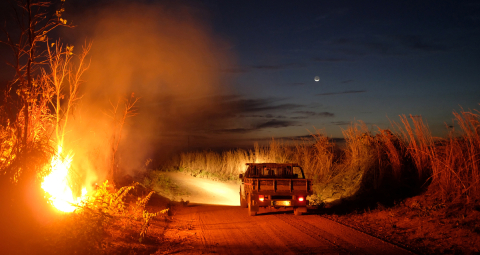BY Peter Diamond | September 6 2019 | ![]() 0 COMMENTS
0 COMMENTS ![]() print
print

Scottish priest who served in Amazon calls on Church to lead on climate change
Publication Date: 2019-09-06
Fr Clarke said: “We are facing an international scandal which has significant implications for the world.”
The fires destroying Brazil’s rainforest ‘is an international scandal,’ a Scottish priest who worked for six years in the Amazon has said as he called for the Church to do more to combat climate change.
Fr Jim Clarke, a Xaverian missionary who is provincial in Great Britain, served in the State of Para, Brazil, as a deacon in 1987 for one year and then as a missionary priest from 1999 to 2004.
Fr Clarke, who is originally from Coatbridge but now serving in Preston, said: “People forget that the Amazon isn’t just a Brazil issue, it’s an international one. We are facing an international scandal which has significant implications for the world.”
During his missionary work, Fr Clarke covered 60 indigenous communities on 72 islands across 700 square kilometres.
His congregation totalled 40,000 people who lived off the land in fishing and farming communities.
The area at the time was impacted by logging, mining and cattle ranching, with two aluminium plants by the side of the Tocantins River—though that was the extent of heavy industry within the region at the time.
Deforestation
“The Amazon fire crisis is truly awful. There has been an 80 per cent increase in the number of fires since last year,” Fr Clarke said.
“Sadly these current fires are very traumatic for people who live there—once you start messing with the ecosystem everything has a knock on effect. It’s the indigenous people who are most affected by the fires and the lack of compassion from the Brazilian president hasn’t helped the dire situation.”
Fr Clarke said deforestation was taking place in the region when he worked there in 1987, as large companies such as McDonald’s were ‘using the land to farm cattle for their burgers.’
“I think the issue of respect is such a big thing: people should respect the rights of tribes who have been there for centuries,” Fr Clarke added. “The allegation that the indigenous people are the cause of deforestation is a myth.”
“There is a need to find alternative economic policies for these farmers that will sustain the Amazon people.”
Landfill
Fr Clarke added that the world could learn much about conservation from the indigenous communities.
“In the State of Para the indigenous people hunt in cycles there and only when they need to. They know the different areas and when is best to hunt and when to leave an area to fallow and regrow. It has been passed on for centuries,” he said.
The former missionary said that the Church could do more to lead on the issue of climate change.
“There has to be a greater sense of awareness and part of that should come through the way we conduct ourselves,” he said.
“When we amalgamated two centres in Preston a lot of stuff from both places ended up in landfill and it is just unnecessary and kind of depressing. There is a lot to be said for [SCIAF sister agency] CAFOD’s message of ‘live simply for a simple life.’
“I’m not an eco-warrior or in any way a shining example but for the Church to be more aware of [these issues] is an important step in the right direction. Yes we have fair trade fortnight in parishes but it is something we should take into our everyday lives.”
Horrified
Fr Clarke praised Pope Francis for taking a lead on the issue but called on bishops to do more to tackle climate change.
“I think the bishops are beginning to speak out on the environment but often it can be too late. Thankfully Pope Francis is leading on it more but there is also times when the Church pulls back because it doesn’t want to prejudice an outcome.
“Overall I think the Church is aware of the big environmental responsibility and the majority of clergy are horrified by what is happening in the Amazon but we can’t leave it too late, we need to act now.”
SCIAF are currently lobbying the Scottish Government to do more to combat climate change and meet rigorous climate emission goals.
SCIAF’s advocacy manager Dr Geraldine Hill said: “The world is facing an ecological, humanitarian and moral crises, as we approach the point of no return from irreversible global warming and climate chaos. Highly–polluting fossil fuels are a major driving force behind this. The communities SCIAF works with in developing countries are already struggling to cope with the impact of climate change.
Government targets
“For this reason in 2017 SCIAF ran a clean energy campaign, calling on the Scottish Government to lead the move from fossil fuels to a clean energy system. SCIAF’s commitment to have no investments in fossil fuel companies, and to avoid investments in the future fits with our commitment to climate justice.”
Scotland’s environment secretary Roseanna Cunningham, a Catholic, said her thoughts go out to everyone affected by the fires.
“Earlier this year Scotland became one of the first countries in the world to acknowledge the fact that we are facing a global climate emergency and the fight to save the Amazon forest, the world’s biggest land-based carbon sink, shows the importance of global co-operation in tackling climate change,” she said.
“Scotland continues to lead the world in how we act, including through our ambition to reach net zero emissions by 2045 at the latest and the package of measures announced yesterday as part of the programme for government which places tackling climate change at the heart of government policy.”










